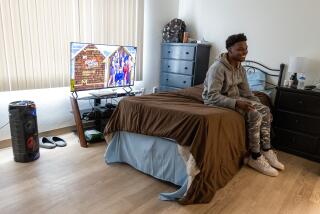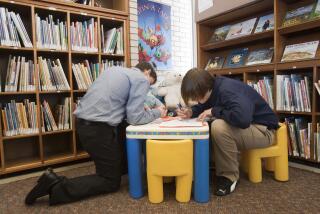Throwing ‘No-Parent’ Kids a Welfare Curveball
- Share via
Americans love athletes who overcome adversity, and the plucky Little League team from Harlem that almost won this year’s World Series had more to overcome than most.
The team came close to disqualification because of residency regulations. Where the three boys involved actually lived was hard to pin down because they apparently belonged to what social welfare experts now call “no-parent families.”
Because of privacy protections, information on the boys’ backgrounds has been scanty, but it seems that they shuttle among households of families and friends in Harlem and other areas of New York City. Such patterns are increasingly common among poor families, especially urban minorities.
Experts believe that this trend is an unintended consequence of welfare reform, which forces many mothers to take odd-hours jobs (often at night) and puts them at risk for benefits loss and homelessness. Stretched to the limit, they cannot maintain homes for their children.
Grandparents often wind up caring for kids. One child in this category was a player on the Little League team. Another player lives with an uncle. Several stay with nonrelatives; one was taken in by a sympathetic truant officer. One boy lived with his father in a homeless shelter.
Such children obviously find a constant in Little League baseball, and the league has been wise enough to promote this benefit by allowing kids to play on a team even after they’ve moved out of its designated area.
Sports pundits claim that Little League baseball can compensate for the absence of stable families in the lives of children like some of those on the Harlem team. Even if this is true, it is a solution that cannot be generalized because teams are highly competitive and many youngsters don’t make the grade.
More often, children from no-parent families fare badly in school, are at greater risk for psychological problems and have higher rates of delinquency than children living with at least one of their parents. Many get swallowed up in the foster-care system.
These outcomes should be foremost in the minds of congressional lawmakers when they take up reauthorization of the Temporary Assistance for Needy Families program in the coming months.
Although congressional supporters claim that the program has been effective in reducing the welfare rolls, the more stringent rules under consideration may well increase the trend toward no-parent families by creating obstacles to consistent parenting.
The bill that probably will come before the Senate is somewhat softer than the House version, but it still does not recognize caring for one’s own children as “work.”
Instead, it imposes identical work requirements on single-parent and two-parent families and ignores the hours spent commuting to jobs, thereby reducing the time parents can spend with their kids.
By limiting access to post-secondary education, the bill also makes it more difficult for parents to work their way out of poverty. It disqualifies parents who have been convicted of drug felonies. And while offering no support for housing, it diverts scarce funds to so-called marriage-promotion programs.
There’s nothing wrong with celebrating the perseverance and spirit of the Harlem team. But we should also be asking Congress to think about ways to make life easier, not harder, for the majority of children in no-parent families--the ones who don’t hit home runs.
More to Read
Go beyond the scoreboard
Get the latest on L.A.'s teams in the daily Sports Report newsletter.
You may occasionally receive promotional content from the Los Angeles Times.










